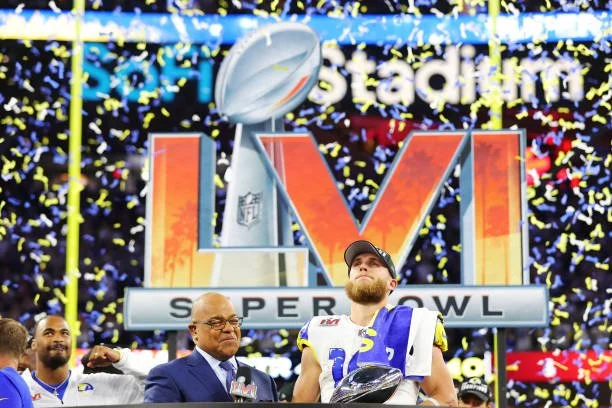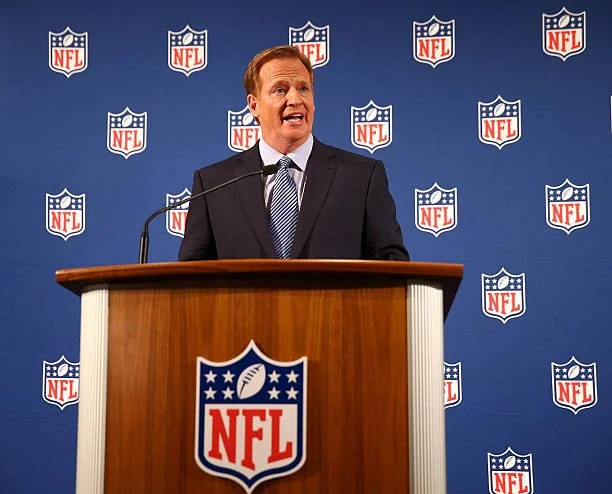Church Fumbles: Avoiding Illegal Super Bowl Parties and How A Church Broke the Law
When preparing for your Super Bowl LVII party, you may pick up drinks, food, and a projector so you and your friends can watch the game in comfort. Oh, and do not forget to study law.
Understanding how the United States law affects a Super Bowl party can be difficult, and that ignorance is what got a church in legal trouble in 2008.
A police vehicle with police tape in front of it as Manuel Oliver called for government officials to prioritize gun violence prevention. (Photo by Stefani Reynolds/AFP via Getty Images)
In Indianapolis, Indiana, Fall Creek Baptist Church decided to host a Super Bowl party. They advertised the event as a ‘Super Bowl’ party on their website.
At this gathering – there would be food available. To cover any expenses, there was an admissions fee.
The National Football League (NFL) caught wind of the event and sent a cease-and-desist letter. Contained in the letter was the notion that their event was violating copyright law.
The Cathedral Of The Holy Angels Church on October 11th, 2011, in Gary, Indiana. (Photo by Raymond Boyd/Michael Ochs Archives/Getty Images)
Exactly the copyright law that was violated was, “U.S. Code 110 – Limitations on exclusive rights: exemption of certain performances and displays.” Section 110(4) negates the, “performance of a nondramatic literary or musical work otherwise than in a transmission to the public, without any purpose of direct or indirect commercial advantage and without payment of any fee… for the performance.”
A performance in this case is presenting the recorded Super Bowl. This was presented to the public and required the payment of a fee.
Los Angeles Rams player Cooper Kupp #10 celebrates their win of Super Bowl LVI o February 13th, 2022. The Los Angeles Rams had defeated the Cincinnati Bengals 23-20. (Photo by Kevin C. Cox/Getty Images)
Copyright law also requires that establishments broadcasting a performance cannot have an, “audiovisual device [that] has a diagonal screen size greater than 55 inches” according to Section 110 (3)(II).
This screen size is decided by Section 110(5)(A), which only allows, “transmission on a single receiving apparatus of a kind commonly used in private homes.” The Church was using a projector, which broke this limit.
A coffee shop in Cairo, Egypt on May 26th, 2018. The people are watching the UEFA Champions League final football match, played between Real Madrid and Liverpool. (Photo by Khaled Desouki/AFP via Getty Images)
When the public became aware of the NFL’s warning, the league received immense pressure nationwide. Even Sen. Arlen Specter of the Senate Judiciary Committee proposed a bill that provided religious organizations exemptions from this copyright law in regard to broadcasting the Super Bowl.
Two weeks following the introduced bill, NFL Commissioner Roger Goodell sent a letter to Sen. Orrin G. Hatch that said, “the league will not object to live showings – regardless of screen size – of the Super Bowl by a religious organization when such showings are free and on premises used by the religious organization on a routine and customary basis.”
The US Capitol in Washington, DC, on January 22nd, 2018 (Photo by Mandel NGAN/AFP via Getty Images)
Goodell’s statement lays out these rules that the NFL later presented, according to The Christian Post, as basic guidelines for hosting a Super Bowl game:
-“Churches can legally host Super Bowl parties on their premises;
-Churches may show the game on whatever size screen they want;
-While churches may not charge admission, they may take up a donation to help with the cost of the event, if desired;
-Finally, to avoid any copyright infringements, churches may want to call their event a ‘Big Game Party’ rather than a ‘Super Bowl Party.’”
The NFL Commissioner Roger Goodell at a press conference in the Hilton Hotel in New York City, New York, on September 19th, 2014. (Photo by Elsa/Getty Images)
These rules make it clear what a Church can and cannot do. However, how does this affect your Super Bowl party?
How you can avoid legal trouble with the NFL is do not host a public screening of the game, do not advertise your screening using copyrighted language, and do not charge admissions. It’s as simple as that.





